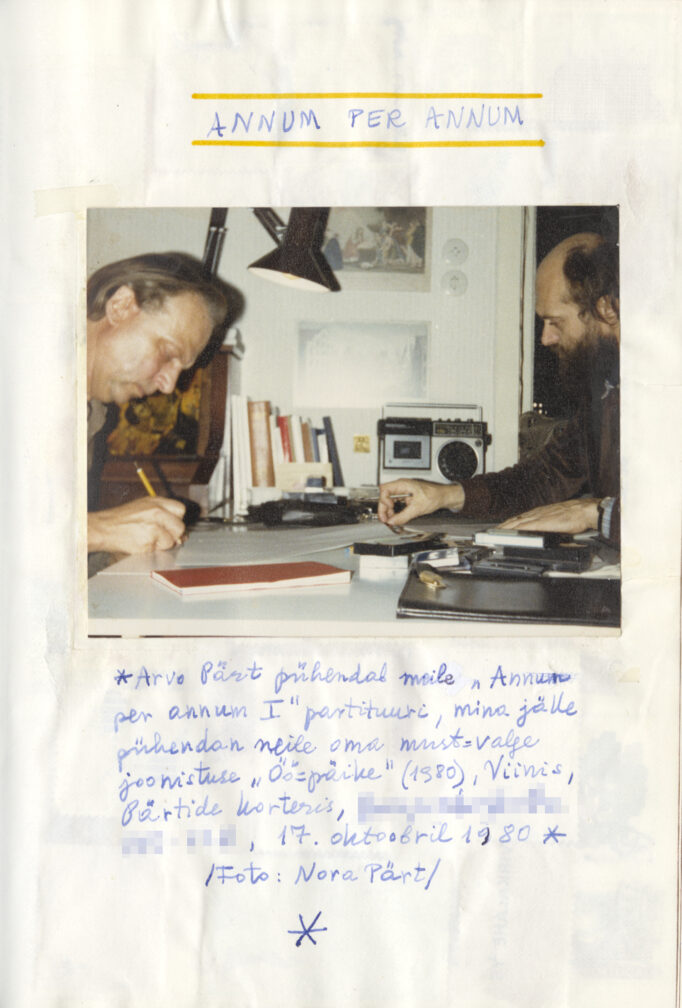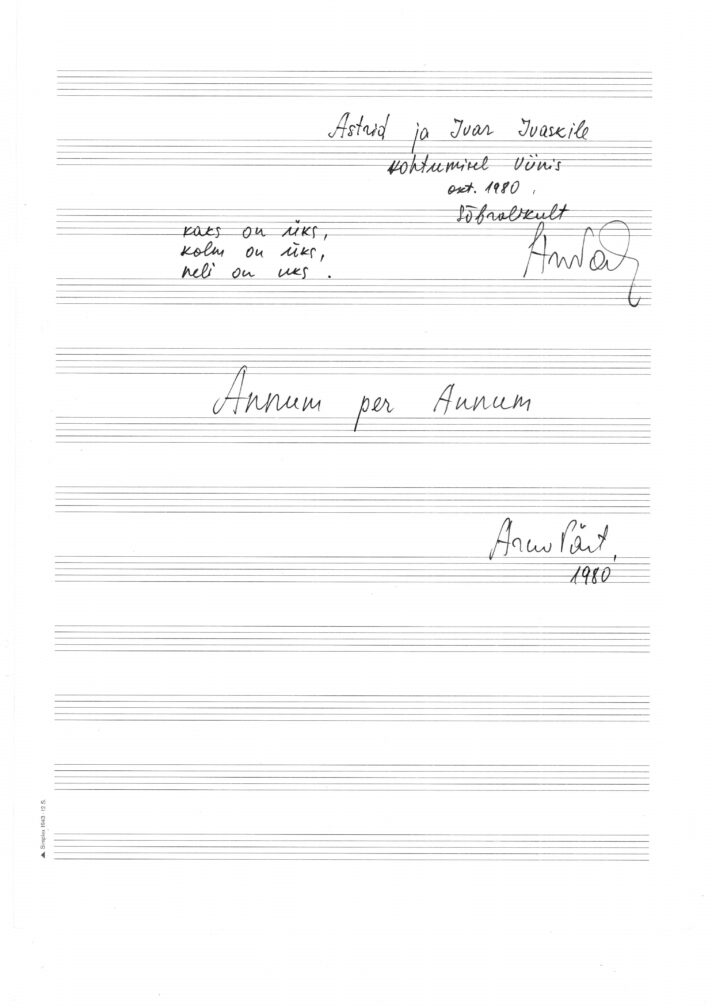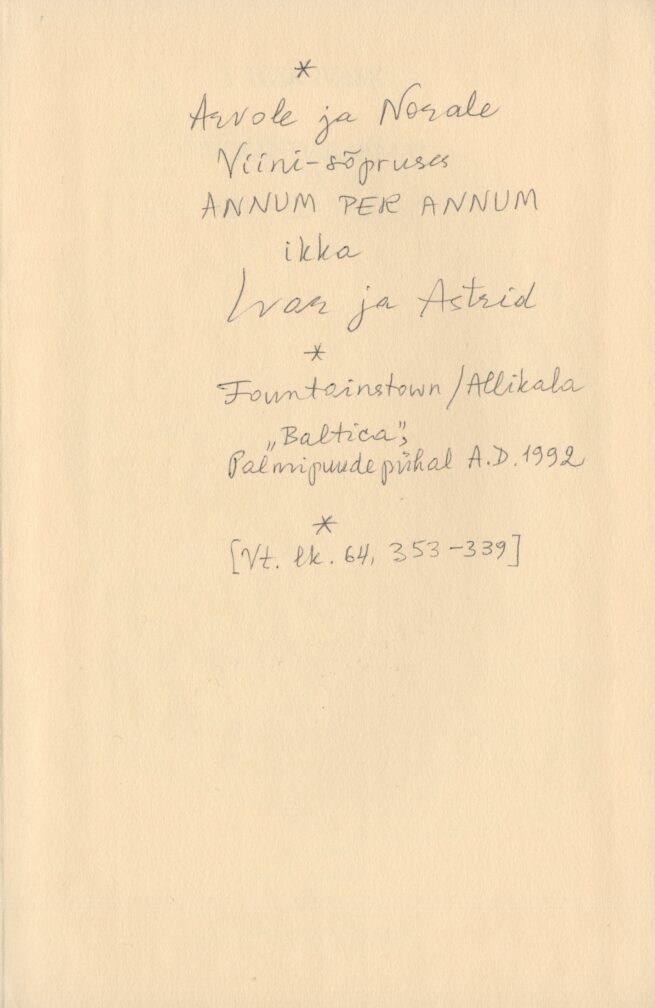Ardo Västrik
Conversations with Arvo and Nora Pärt reveal the rich history and context of the composer’s works. When combined with archival research, these may also occasionally result in exciting discoveries. Earlier this year, a discussion at the Arvo Pärt Centre focused on the creation of the piece Annum per annum. This organ composition premiered on 12 October 1980 at a concert in Speyer Cathedral in Germany, marking the church’s 950th anniversary. Organist Leo Krämer performed the piece. Commissioned by Südwestfunk Baden-Baden, Annum per annum was among the first works Pärt composed after the family emigrated to the West.
During the captivating discussion moderated by Karin Rõngelep, a note in the composer’s music diary from 17 October 1980 caught my eye: “Ivar Ivask in Vienna. I gave him the first version of “A p A” with the verse:
two are one
three is one
four is a door.”[i]
Ivar Ivask (1927–1992) was an Estonian poet, essayist and artist in exile. He served as the long-time editor of the international literary magazine World Literature Today, and after emigrating spent most of his time in the US. In 1980, Ivask toured Europe with his wife, Latvian poet Astrid Ivask, and they spent a month in Vienna that autumn. A simple information request revealed that Ivask maintained a diary from 1964 until the end of his life, totalling 56 volumes and tens of thousands of pages (!).
Intrigued, I sought to discover if Ivask had documented his meeting with Arvo Pärt and provided any information about the gifted manuscript. Learning that Ivask’s Estonian and Estonia-related heritage is housed in the Estonian Literary Museum, I explored the Ivar Ivask fund in the Cultural History Archives managed by the institution. Flipping through the diaries of that time, I was excited to find that Ivask had eagerly anticipated meeting the Pärts and dedicated page upon page to their time together. It was confirmed that Arvo Pärt had indeed given the manuscript of the first version of Annum per annum to the Ivasks, as evidenced by a photo pasted in the diary with the note: “Arvo Pärt dedicates the score of Annum per annum I to us. I, in turn, dedicate my black-and-white drawing Night – Sun (1980) to them, in Vienna […]. Photo: Nora Pärt.“

A page from Ivar Ivask’s diary (EKM EKLA, f. 409, container 38:2, fol. 315)
Unfortunately, it turned out that the sheet music itself is not listed among Ivar Ivask’s documents in Tartu. However, hope was not lost, considering that after Ivask’s death, some of his documents also remained in Latvia. Today, a significant portion of Ivar and Astrid Ivask’s extensive heritage is stored in the University of Latvia Academic Library in Riga.
Through correspondence with Astrid Ivask’s long-time friend, Latvian writer and translator Anna Žīgure, it became clear that the gifted manuscript resides in the library of the University of Latvia. With Žīgure’s assistance, the Arvo Pärt Centre obtained a digital copy of the sheet music.

The first page of the Annum per annum manuscript with a dedication to Astrid and Ivar Ivask (LU AB MR A. Ivaskas f. 497)
Upon viewing the sheet music, one can observe that the familiar Annum per annum known to listeners is more detailed and refined than the original version. Yet, from an archival perspective, it is very interesting to explore the composer’s earlier version, which already has the foundational essence. Additionally, there are more distinct references to the motifs of earlier film music, which in the refined version are less detectable.
To our knowledge, very few complete sketches of Annum per annum have survived.
Arvo Pärt shared a delightful story about this meeting, which took place on 17 October 1980. An error had slipped into the dedication attached to the manuscript Pärt gave to Ivask, and he drew attention to it upon handing over the notes. (In the dedication above, it read “neli on uks” instead of “neli on üks”.) Ivask, in turn, shared a story about native American art, where an imperfection (mistake) was deliberately made in an extremely precise pattern to “release the devil”.
A year later, Ivar Ivask completed the poem The Veranda Book, which includes a verse titled Arvo Pärt.
Those recurring chords
resonance of bells
that continuous swell
sacred rivers of sound
gentle angelus
this surging return
upon angelic scales
gentleness of bells
essential simplicity’s
angelus[ii]
The impact of that autumn meeting evidently lingered with Ivask, as even a decade later, when he sent his selected works in Estonian to the Pärts, he mentioned it in the dedication.

Ivar Ivask’s dedication in the collection Verandaraamat ja teisi luuletusi (Tallinn: Eesti Raamat 1990) in the Arvo Pärt Centre library.
Mari Tarvas, Sirje Olesk, Mari Õunapuu, Sirje Kiin and Anna Žīgure contributed to the search for the manuscript.
[i] Arvo Pärt had made a mistake in the dedication, forgetting to add diacritical marks and therefore the word “üks” (one) had become “uks” (door).
“kaks on üks
kolm on üks
neli on uks.”
[ii] https://www.poemhunter.com/poem/arvo-p-rt/